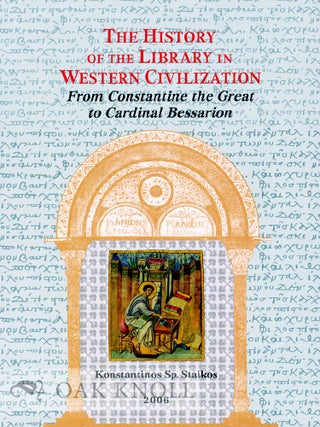Preface
In this third volume of The History of the Library in Western Civilization: From Constantine the Great to Cardinal Bessarion, we look at the continuity of the Graeco-Roman literary tradition, the fate of the monumental libraries of antiquity, and book production and marketing generally, from the proclamation of Constantinople as capital of the Roman Empire in 330 to the Turkish conquest in 1453. This new Christian empire, which came to be known as the Byzantine Empire, inherited a huge wealth of cultural and scholarly accomplishment comprising the entire corpus of Greek and Latin literature, which was deposited in all kinds of public and private libraries in the East and West: from the Ptolemies' Universal Library in Alexandria to the numerous imperial and other libraries in Rome, from the academic libraries of the philosophy schools in Athens to the privately-endowed libraries of Celsus and Rogatianus at Ephesus and Thamugadi respectively. However the methods of book distribution and marketing and the fortunes of the bilingual libraries in the Mediterranean region were drastically altered by the establishment of Christianity as the official religion of the Empire, the drive to impose orthodox dogma, the constant exhortations to the faithful to change their outlook on life and the efforts to promote a new genre of literature - the literature of Christianity. But none of these changes occurred overnight. The monumental libraries went into a gradual decline before eventually being abandoned, giving way to monastic libraries, and schools for higher studies were opened in the monasteries, while libraries in private premises on the model of the Graeco-Roman architectural tradition were no longer to be found.
The first book-related projects launched by the rulers of the new Christian empire appear to signal the dawn of a new era in which ancient and Christian literature coexisted on an equal footing. Constantine the Great ordered fifty sumptuous copies of the Bible from a scriptorium in Caesarea, to meet the needs of ecclesiastical foundations in Constantinople, while Constantius II instructed Themistius to organize the first public university library in the capital, to contain secular works only. Indeed, Themistius states explicitly in his panegyric to the Emperor that in that process of bibliological reform, which involved transferring written works from papyrus rolls to codices, not one book was ruled out and that even the most arcane writings had their place in the new library. The life and work of Julian, an emperor who dreamed of restoring the values of the ancient world, further enlarged the stock of books available in the capital, for he was the greatest bibliophile of all the Byzantine emperors and the only one who had a separate building erected to house his private library.
Those two imperial initiatives were not followed up, however, and by the late fourth century the first monasteries in Constantinople and the surrounding country were already beginning to show signs of developing into centres of scholarship and book-copying. The Monastery of the Acoemeti, for example, possessed an excellent archive of conciliar resolutions and writings on the Christological question, and its library may have had separate Greek, Latin and Syriac sections containing secular as well as religious works. And so, little by little, monastic libraries evolved into a 'divine republic of letters': the library was the heart and soul of the community, and its multiple functions played a decisive part in the creation and preservation of a body of Christian literature. When Justinian founded the Monastery of St. Catherine on Mount Sinai, on the Empire's eastern frontier, and perhaps donated some books to form the nucleus of its library, he could hardly have foreseen that not only would the monastery survive for centuries in hostile territory but its library would be continually enriched with books of many different kinds, written in many different languages, until it became a 'transnational' Christian library that would be respected by believers and non-believers alike right down to the present day.
But the transfusion of ancient literature to the monastic libraries was not accomplished painlessly. Though it is true that the grammatici with their libraries were still fulfilling their role as apostles of learning even in the late fourth century, but this picture does not reveal the whole truth. For example, Libanius's pupils in Nicomedia had discussions about books, and books were produced and distributed far and wide in the Empire - as far afield as Athens - as if nothing had changed since the time of the Second Sophistic, Aelius Aristides and the Philostrati; but the scene is deceptive. It is true, too, that Libanius's auditors included Basil the Great and Gregory of
Nazianzus; but the imperial court forbade the young Julian to take lessons in philosophy, with the result that he had to copy other students' notes secretly. Nor is it a coincidence that Priscus turned his house in Athens into a philosophy school whose members kept its existence a close secret. These two poles are merely symptoms of the times, signals of the end of an era inaugurated by the sophists in Athens and more particularly by Aristotle, who, in his teaching, used his private library as his principal tool for the transmission of knowledge.
The Apostles strove to support the few, scattered early Christian communities with their epistles, but they never realized that by so doing they were sparking off a surge of writing that would soon make Christianity a 'religion of books'. Quite apart from the fact that a steady stream of apologetics, antirrhetics, dogmatics and polemics, numerous works of ecclesiastical history and patristic writings appeared in the period when Christianity was putting down roots, every Christian was expected to demonstrate his faith in the name of the book.
From "Preface"
Konstantinos Staikos

